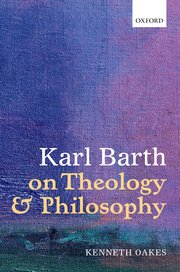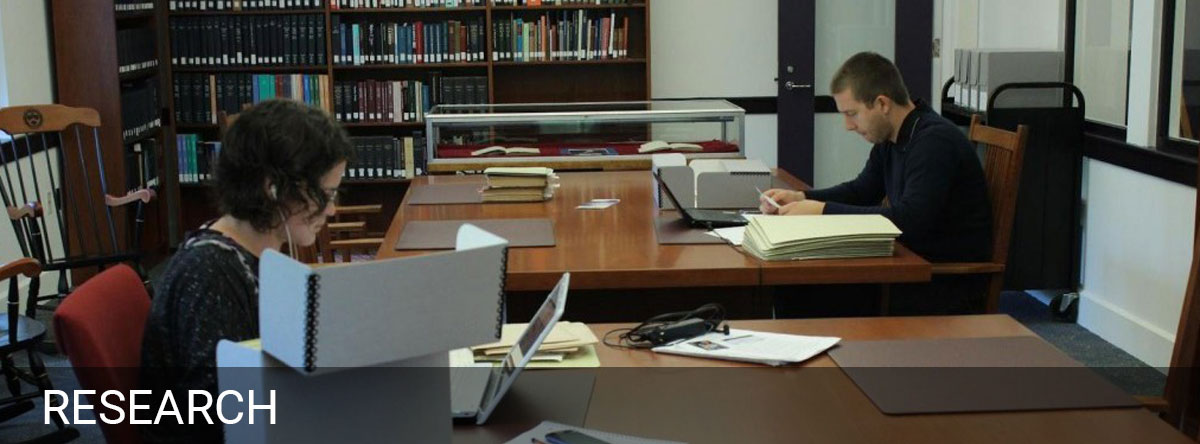 Oakes, Kenneth. Karl Barth on Theology and Philosophy (Oxford: Oxford University Press, 2012), 304 pp. $125.00 (hardcover).
Oakes, Kenneth. Karl Barth on Theology and Philosophy (Oxford: Oxford University Press, 2012), 304 pp. $125.00 (hardcover).
Reviewed by Derek Alan Woodard-Lehman (July 01, 2016)
As its title indicates, Kenneth Oakes’ Karl Barth on Theology and Philosophy provides a comprehensive interpretation of Barth’s views on theology, philosophy, and their relationship to one another. Oakes – Assistant Professor of Systematic Theology at the University of Notre Dame – self-consciously follows the now familiar method of Bruce McCormack by providing a “genetic account” of the overall development of Barth’s thought on these matters. Oakes begins with the previous interpretations of Cornelius Van Til, Jörg Salaquarda, Henri Delhougne, and Johann Friedrich Lohmann, but moves well beyond them. Unlike these earlier, more selective interpreters, Oakes’ work spans the entirety of Barth’s career and the variety of his writings. He begins with Barth’s earliest published essays and ends with his latest public remarks transcribed in the Gespräche. The fruit of Oakes’ unparalleled comprehensiveness is an argument for robust continuity between Barth’s early and late theology, both on the issue philosophy and in general. Like Hendrikus Berkhof, Oakes sees Barth as a “Hermannian of a higher order.” And like McCormack, but with a provocative twist, Oakes sees Barth as a “hyper-Hermannian” who is not only “orthodox and modern” but “orthodox and liberal” as well (59, 244, 250).
In the “Introduction,” Oakes contrasts his own genetic approach to those he terms “formalist” and “particularist” (18). Formalist approaches focus on Barth’s explicit programmatic statements about philosophy. They look for those general apologetic and polemical remarks that characterize Barth’s early liberal theology and later dialectical theology. But they tend to reduce Barth’s views to slogans like “theology against philosophy” or “theology subsumes philosophy.’” The well-known works of Cornelius Van Til and Trutz Rendtorrf are “formalist” in this sense. Particularist approaches focus instead on Barth’s direct engagement with individual philosophers. They look for his specific remarks about thinkers like Kant, Hegel, and Natorp. But they tend to reduce the textual evidence examined to a very narrow range. The lesser-known works of Simon Fisher and Walter Lowe are “particularist” in this sense. Oakes finds both approaches deficient, writing, “If the first option results in bare and largely uninformative statements, then the second offers little more than a sophisticated index” (18).
Oakes incorporates the strengths of formalist and particularist approaches while avoiding their weaknesses by looking beyond obvious texts, yet without overlooking them. In chapters two through five, he treats the “usual suspects,” including “Fate and Idea” (1929), “Theology and Philosophy” (1960), and the discussion of “conceptual subordination” in the Dogmatics’ subsection “Freedom Under the Word” (1938). In chapter six, he importantly treats neglected texts in Barth’s moral theology, such as “The Problem of Ethics Today” (1922), “Theological and Philosophical Ethics” (1930), as well as the series of lectures published as Ethics (1928-1930). To these Oakes adds a lengthy exposition of the Kant chapter from Barth’s Protestant Theology in the Nineteenth Century (1926-1933) – regrettably, without paying similar attention to the equally important Hegel chapter. And throughout, Oakes patiently traces Barth’s less programmatic engagements with philosophy throughout the various stages of his development from Romans to Dogmatics.
As a result of this impressive exegetical labor, Oakes reveals that Barth’s use of the term “philosophy” has four distinct senses. First, and most generally, “philosophy” names those basic ideas, beliefs, values, norms, and ideals that form the background of all human doing, saying, and thinking in any sociohistorical context. Second, and more determinately, in Barth’s context “philosophy” sometimes names the canonical Western tradition running from Plato to Kant, as well as the overall intellectual and cultural milieu that tradition creates. Third, “philosophy” sometimes names particular canonical figures or schools with a tradition, such as Kant or Neo-Kantianism. In this, the second and third senses of philosophy name the specific content that performs the general function of philosophy in the first sense. Fourth, and finally, “philosophy” names “systematic” thinking that aspires to “totality.” Barth often glosses this last sense of philosophy as “metaphysics,” whether it is that of transcendental logic or that of natural theology. Western philosophy is emblematic of philosophy in this fourth sense. Idealist philosophy is paradigmatic of it.
With this revelation alone, Oakes far surpasses his formalist and particularist predecessors. Formalists have mistakenly treated “philosophy” flatly, as if it always signified the same thing. Particularists have mistaken the part for the whole, falsely assuming that Barth’s view on a specific philosopher or philosophy was equivalent to his view of philosophy in general. Getting right about how previous accounts have gone wrong is an accomplishment in itself. But Oakes does more. He attempts to set things right. He does so by noting that Barth’s sensibility about “philosophy” varies dramatically according to which sense of philosophy is under discussion. Oakes concludes that, “It is safe to say that Barth tended to be more comfortable with philosophy as a local knowledge [i.e., first sense] or historical pursuit [i.e., second and third senses] than he was with philosophy as a global venture [i.e., fourth sense]” (160). Put differently, the more determinate and determinative “philosophy” becomes, the more determined Barth becomes to maintain theology’s independence.
Oakes turns to Barth’s sense of his own use of philosophy in chapter seven, “Afterthoughts.” By Barth’s own reckoning, he most often uses “philosophy” in the first two senses, sometimes in the second sense, and never in the fourth sense. Insofar as all human doing, saying, and thinking necessarily rely on ideas, beliefs, and values, so too theology relies on philosophy in the first two senses. This is unexceptional, and therefore unexceptionable. And insofar as Barth sees his own use of philosophy in the third sense as “eclectic” and “ad hoc,” he sees it as innocuous. Oakes best captures Barth’s sense of himself by reporting a pithy nautical metaphor from his debate with Emil Brunner. In contrast to Brunner, who Barth describes as having a philosophical “harbor,” Barth describes himself as having many philosophical “ports of call” but no “anchorage” (113-114).
Oakes further exhibits Barth’s self-understanding by reporting two similarly memorable exchanges form his 1962 lecture tour of the United States. The first is from a panel discussion at the University of Chicago. When Schubert Ogden queried Barth if his theology “depended” on philosophy, Barth flatly denied it, remarking, “Take this glass of water, for example. I am not dependent upon it” (238.) To which Jaroslav Pelikan quipped, “But you are dependent on water in general – if not on this particular glass” (ibid). The second exchange is taken from a conversation at Princeton Seminary. When a seminarian asked about his use of Kant and Plato, Barth admits that, “I have a little philosophy somewhere in my head.” Yet he insists that, on the specific point under discussion, “I never thought of any philosophy in this relation.” For Barth, it is licit to have a little philosophy “in your head.” But it is illicit to have any “in mind.” As a “free and happy science,” theology is freed from having to presuppose a philosophical basis for itself. Yet it is free to have whatever philosophical basic presuppositions suit its purposes.
Here, near its conclusion, the great strength of Oakes’ books issues in a small, but significant weakness. Throughout, Oakes has aimed to present his readers with Barth’s own account of theology and philosophy as he himself presents it. Oakes succeeds masterfully on this count. However, Barth’s own account of theology and philosophy does not fully account for the presence and influence of philosophy in his theology. Although far more comprehensive than its formalist and particularist predecessors, Oakes’ account is not exhaustive. And, to be fair, it neither aims to be nor claims to be so. Still, Oakes’ reinterpretation remains selective. He appraises the philosophy theme only in terms of Barth’s explicit thematization of philosophy. He leaves aside the many places where the presence and influence of philosophy can be seen even when it is not named.
To mention but one prominent example, Oakes pays no attention to the fundamentally Kantian account of empirical cognition as the synthesis of intuition and understanding that governs Barth’s theological epistemology throughout the course of his career. Here, as elsewhere, the issue is not so much “Karl Barth on theology and philosophy” as it is “philosophy in Karl Barth’s theology.” It is not a matter of what Barth says about philosophy, or even what he says about what he is doing with philosophy. It rather is a matter of what Barth actually does with philosophy. And what matters most is not whether or not Barth had a little philosophy “in his head” without having any “in mind,” but whether or not there is philosophy on the page.
This criticism, to be sure, is minor. It regards what Oakes has left undone, rather than what he has done. And, in many ways, the desire for Oakes to do more is motivated by the fact that what he has done, he has done so very well. Oakes has given us what he promised: an interpretation of Karl Barth’s account of theology and philosophy in his own words. He has given us a comprehensive orientation to Karl Barth’s own account of theology, philosophy, and their relation to one another. This, in turn, should generate an equally comprehensive reorientation of in subsequent interpretation of the presence and influence of philosophy in Barth’s theology.
The views expressed here are strictly those of the author; they do not necessarily represent the views of the Center for Barth Studies or Princeton Theological Seminary.


